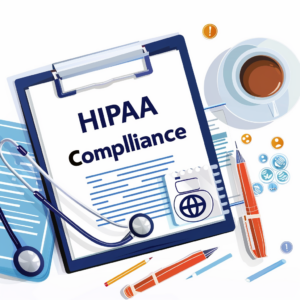
13 Nov Step-by-Step Guide to HIPAA Compliance for Business Associates

HIPAA compliance for business associates is a crucial requirement for anyone handling sensitive health information. Being a business associate means your organization must adhere to strict privacy and security standards to protect patient data. These standards, established by the Health Insurance Portability and Accountability Act (HIPAA), ensure that personal health information remains confidential and secure.
Why is this important? For business associates, maintaining HIPAA compliance isn’t just about avoiding hefty penalties—it’s about building trust with the healthcare providers you serve and ensuring the privacy of the individuals’ data you handle. Understandably, this can seem complex and overwhelming, but getting it right is key to smooth operations and strong relationships in the healthcare industry.
In the following guide, we’ll break it down into manageable steps, helping business associates achieve and maintain HIPAA compliance efficiently.
Understanding HIPAA and Business Associates
The Health Insurance Portability and Accountability Act (HIPAA) sets the standard for protecting sensitive patient data in the United States. It requires that any organization dealing with protected health information (PHI) must ensure that all the required physical, network, and process security measures are in place and followed.
What is a Business Associate?
A business associate is any person or entity that performs activities involving the use or disclosure of PHI on behalf of, or provides services to, a covered entity. These services can range from claims processing to data analysis or even document storage. If your company interacts with PHI in any way for a covered entity, you are considered a business associate.
Example: Insurance companies often need to handle claims processing, making them business associates under HIPAA rules. They must ensure they have the right safeguards in place to protect PHI during these processes.
Handling Protected Health Information (PHI)
Business associates must manage PHI with the utmost care. This involves implementing administrative, physical, and technical safeguards to protect the confidentiality, integrity, and availability of the information.
Key Points for Handling PHI:
- Administrative Safeguards: Develop security measures and conduct regular risk assessments to manage the protection of PHI.
- Physical Safeguards: Control physical access to protect against inappropriate access to PHI, whether electronic or paper-based.
- Technical Safeguards: Use technology to protect PHI, including encryption and secure data transmission methods.

The transition to electronic medical records has amplified the need for secure systems. Implementing these safeguards helps prevent breaches and ensures compliance with HIPAA regulations.
For business associates, understanding and implementing these standards is not just about compliance; it’s about maintaining trust and integrity in their relationships with covered entities and the individuals whose data they handle.
In the next section, we will dig into the specific responsibilities business associates must uphold to remain compliant with HIPAA.
Key Responsibilities of Business Associates Under HIPAA
Business associates have a critical role in safeguarding protected health information (PHI) as required by HIPAA. This involves implementing administrative, technical, and physical safeguards and adhering to breach notification rules. Let’s explore these responsibilities in more detail.
Administrative Safeguards
Administrative safeguards are the foundation of HIPAA compliance for business associates. They involve risk assessments, developing security policies, and training employees on data protection practices.
-
Risk Assessments: Regularly analyze potential risks to PHI and implement measures to mitigate these risks. This proactive approach helps identify vulnerabilities before they lead to breaches.
-
Security Policies: Develop and document clear policies regarding the handling of PHI. This includes procedures for data access, incident response, and employee conduct.
-
Training Programs: Educate staff about HIPAA rules and the importance of protecting PHI. Training should be ongoing and updated as policies or regulations change.
Technical Safeguards
Technical safeguards focus on the technology used to protect PHI. These measures are crucial in the digital age, where electronic health records are standard.
-
Encryption: Encrypt PHI to protect it during transmission and storage. Encryption is a vital defense against unauthorized access.
-
Access Controls: Implement strict access controls to ensure only authorized personnel can view or modify PHI. This can include password protection and user authentication.
-
Audit Controls: Maintain audit logs to track who accesses PHI and what actions are taken. This transparency is essential for identifying potential breaches or unauthorized activities.
Physical Safeguards
Physical safeguards protect the physical environment where PHI is accessed or stored. This includes both electronic and paper records.
-
Facility Access Controls: Limit access to areas where PHI is stored or processed. Use security measures like locks, surveillance cameras, and access badges.
-
Workstation Security: Ensure that workstations with access to PHI are secure. This can involve screen privacy filters and automatic log-off features.
-
Device and Media Controls: Manage the use and disposal of devices and media containing PHI. This includes secure disposal methods for paper records and wiping data from electronic devices before disposal.
Breach Notification
In the event of a breach, business associates must act swiftly to comply with HIPAA’s breach notification requirements.
-
Timely Reporting: Notify the covered entity of any breach involving unsecured PHI without delay. This allows the covered entity to inform affected individuals and the Department of Health and Human Services (HHS) as required.
-
Documentation: Keep detailed records of breaches, including how they occurred and the steps taken to mitigate them. This documentation is crucial for compliance audits and investigations.
By fulfilling these responsibilities, business associates not only comply with HIPAA but also protect the trust of the covered entities and individuals they serve.
In the next section, we will discuss the specific requirements for Business Associate Agreements (BAAs) and other compliance obligations that business associates must meet.
HIPAA Compliance for Business Associates
When it comes to HIPAA compliance for business associates, understanding the requirements for Business Associate Agreements (BAAs), privacy provisions, and compliance obligations is essential. Let’s break these down:
Business Associate Agreement (BAA) Requirements
A Business Associate Agreement (BAA) is a legally binding document that outlines the responsibilities of a business associate regarding the handling of PHI. This agreement is crucial for ensuring HIPAA compliance.
-
Purpose of the BAA: The BAA provides “satisfactory assurances” that the business associate will safeguard PHI and only use it for the purposes specified by the covered entity. This is a key requirement under HIPAA regulations.
-
Key Elements: The BAA must include terms that require the business associate to implement appropriate safeguards, report any breaches of PHI, and ensure that any subcontractors they work with also comply with HIPAA requirements.
-
Documentation: It’s vital that the BAA is documented and signed by both parties. This document serves as evidence of compliance and can protect both the covered entity and the business associate in case of a breach.
Privacy Provisions
Privacy provisions are fundamental to protecting PHI and maintaining compliance with HIPAA.
-
Minimum Necessary Standard: Business associates must ensure that any use or disclosure of PHI is limited to the minimum necessary to accomplish the intended purpose. This minimizes the risk of unnecessary exposure of sensitive information.
-
Confidentiality and Security: Business associates are obligated to maintain the confidentiality, integrity, and availability of PHI. This involves implementing both physical and technical safeguards to prevent unauthorized access or disclosure.
-
Patient Rights: Business associates must respect patient rights concerning their PHI, such as the right to access their information or receive an accounting of disclosures. This is part of ensuring transparency and trust.
Compliance Obligations
Business associates have several compliance obligations under HIPAA, and failing to meet these can result in significant penalties.
-
Risk Assessments: Conduct regular risk assessments to identify vulnerabilities in the handling of PHI. This proactive measure helps in preventing potential breaches.
-
Training and Awareness: Ensure that all employees are trained on HIPAA regulations and the importance of protecting PHI. Ongoing training is necessary to keep everyone updated on policy changes and new threats.
-
Incident Response Plan: Develop an incident response plan to address potential data breaches swiftly and effectively. This plan should outline steps for containment, investigation, and notification.
-
Documentation and Reporting: Maintain detailed records of compliance efforts, including risk assessments, training sessions, and any incidents or breaches. This documentation is crucial for audits and demonstrates a commitment to compliance.
By adhering to these HIPAA compliance requirements, business associates not only protect PHI but also build trust with covered entities and patients. In the next section, we will explore how to avoid HIPAA liability and ensure compliance through risk assessments and proper agreements with subcontractors.
How to Avoid HIPAA Liability
Avoiding liability under HIPAA is crucial for business associates. Here’s a step-by-step guide to help you stay compliant and avoid potential pitfalls.
Conduct Regular Risk Assessments
One of the most effective ways to avoid HIPAA liability is to conduct regular risk assessments. This involves:
-
Identifying Vulnerabilities: Analyze your systems to find any weaknesses that could lead to a breach of PHI.
-
Implementing Safeguards: Once vulnerabilities are identified, put measures in place to address them. This might include upgrading software, enhancing security protocols, or training staff.
-
Documenting Findings: Keep detailed records of each assessment and the steps taken to mitigate risks. This documentation can be crucial in demonstrating compliance during an audit.
Secure Business Associate Agreements (BAAs) with Subcontractors
If you work with subcontractors who handle PHI, have a Business Associate Agreement (BAA) in place. Here’s why:
-
Ensure Compliance: A BAA ensures that subcontractors are also compliant with HIPAA regulations. This agreement outlines their responsibilities in safeguarding PHI.
-
Protect Yourself: The BAA serves as legal protection, showing that you’ve taken steps to ensure all parties involved are committed to compliance.
-
Regular Reviews: Periodically review these agreements to ensure they remain up-to-date with any changes in regulations or business operations.
Respond Promptly to Breach Notifications
In the event of a breach, immediate action is necessary to comply with HIPAA requirements:
-
Notification: Inform the covered entity of the breach as soon as possible. This allows them to take necessary steps to notify affected individuals and the Department of Health and Human Services (HHS).
-
Mitigation: Work quickly to contain the breach and minimize any potential damage. This might involve securing compromised data or enhancing security measures.
-
Documentation: Record all actions taken in response to the breach. This documentation will be important if there’s an investigation into the incident.
Obtain Compliance Certification from Employees
Ensure your team understands and adheres to HIPAA regulations by:
-
Training Programs: Conduct regular training sessions to educate employees about HIPAA rules and their role in maintaining compliance.
-
Certification: Require employees to sign a compliance certification after training. This document confirms they understand the policies and agree to follow them.
-
Access Control: Limit PHI access to only those employees who have completed training and signed the certification. This reduces the risk of unauthorized access or breaches.
By following these steps, business associates can significantly reduce their risk of HIPAA liability. Next, we will answer frequently asked questions about HIPAA compliance for business associates.
Frequently Asked Questions about HIPAA Compliance for Business Associates
Does a business associate need to be HIPAA compliant?
Yes, business associates must be HIPAA compliant. They are required to adhere to the same standards as covered entities when it comes to handling Protected Health Information (PHI). This includes implementing administrative, physical, and technical safeguards to protect PHI from unauthorized access or disclosure. Business associates must also conduct regular risk assessments and ensure that any subcontractors they work with are also compliant by securing Business Associate Agreements (BAAs).
Are business associates liable for HIPAA violations?
Absolutely. Business associates can be held liable for HIPAA violations. The Health Information Technology for Economic and Clinical Health (HITECH) Act made business associates directly accountable for certain HIPAA requirements. This means they can face penalties for non-compliance, just like covered entities. Penalties can range from fines to criminal charges, depending on the severity of the violation. For example, knowingly obtaining or disclosing PHI without authorization can result in fines up to $50,000 and one year in prison. If done with intent for commercial gain, penalties can reach up to $250,000 and ten years in prison.
What are business associates not permitted to do?
Business associates are not allowed to disclose PHI unless specifically authorized by their agreement with the covered entity. They must adhere to the minimum necessary standard, which means they should only access or use the least amount of PHI required to perform their duties. Additionally, they cannot use PHI for their own purposes or commercial gain. Violating these provisions can lead to serious penalties, including fines and legal action. Business associates are also prohibited from retaliating against individuals who file a HIPAA complaint or participate in an investigation.
In summary, understanding and adhering to HIPAA compliance is not optional for business associates. It is a legal obligation that ensures the protection of sensitive health information and helps avoid significant penalties.
Conclusion
At American Retrieval, we understand that HIPAA compliance for business associates is not just a legal requirement but a crucial aspect of our service. Our commitment to safeguarding Protected Health Information (PHI) is unwavering, and we continuously strive to meet and exceed compliance standards.
Our integration with client databases ensures real-time updates, providing seamless and secure access to medical records. We prioritize exceptional customer service, and our unique policy of no charges for unsuccessful record retrievals sets us apart in the industry.
Compliance is an ongoing commitment. We regularly update our policies and procedures to align with the latest regulations and best practices. By doing so, we protect not only the sensitive information entrusted to us but also the trust and reputation we have built with our clients.
For more information on how we maintain HIPAA compliance and support our clients, visit our HIPAA Compliance Guide.





